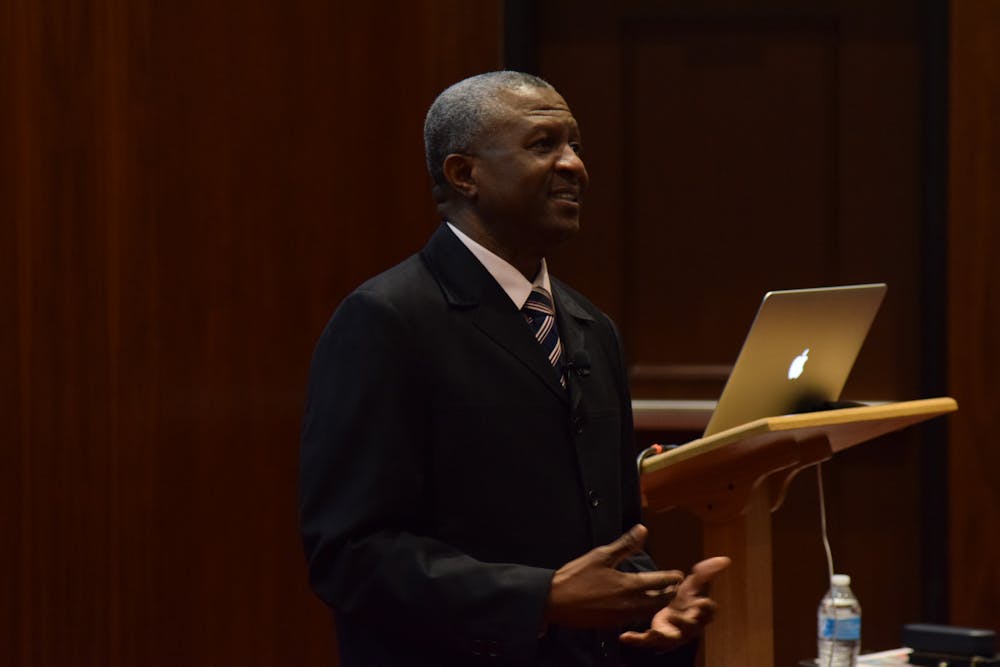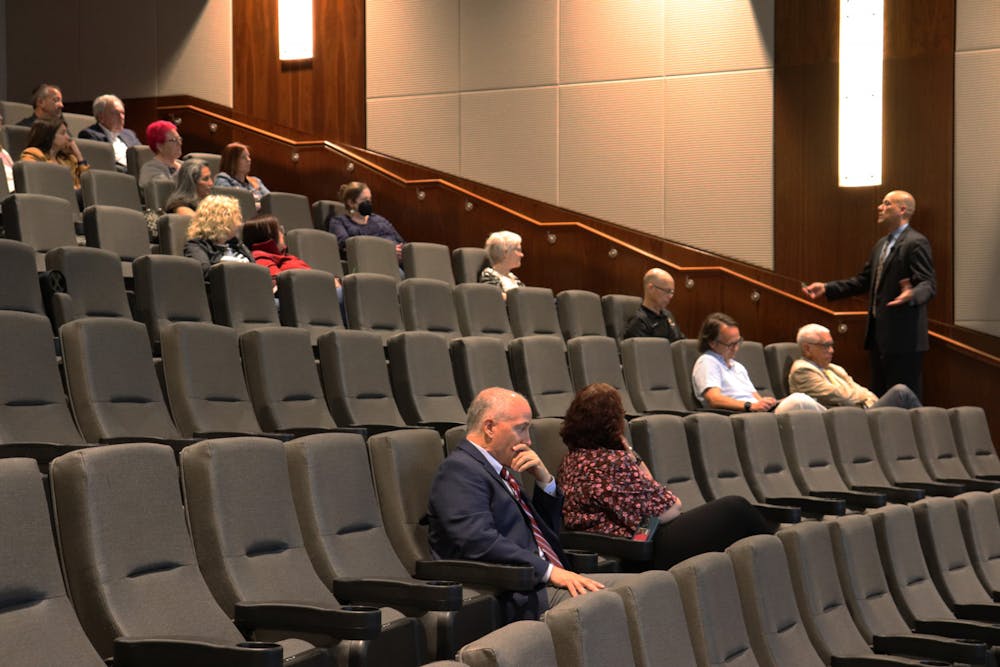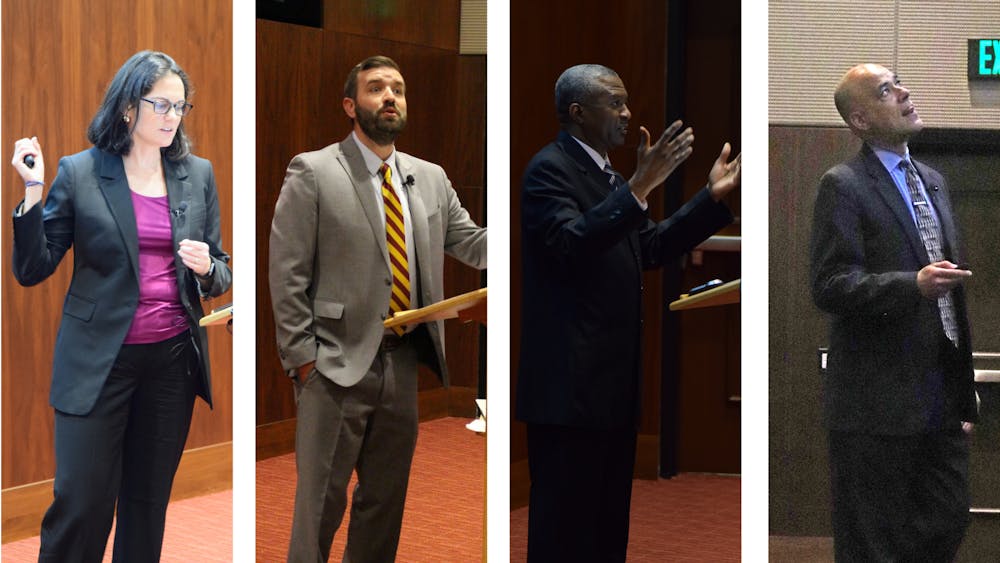Elon University is searching for its next dean for the School of Communications, where Kenn Gaither currently serves as the interim dean.
Professor of cinema and television arts Naeemah Clark is co-chair of the search committee — along with Dean of Elon College Gabie Smith — and said the committee is looking for a candidate who thinks about the role of staff and faculty, raises money, makes good decisions and cares about students and diversity, equity and inclusion.
“It's a lot. We're looking for a lot,” Clark told Elon News Network. “I think that all the candidates we brought in, each of them brings in something different.”
According to Clark, the dean search has been interesting because April 2023 is late for a candidate to commit to the 2023-24 school year. Typically, Clark said the position would be chosen around February.
The committee released each candidate's name and resume one day before their arrival on campus. Clark also said while the university president and provost make the final decision, the committee will have their report turned into them the week of May 1.
Rebecca Blatt
The first of the four candidates to present for Elon’s School of Communications dean, Rebecca Blatt, presented on campus April 14. Blatt is currently a senior associate dean and professor at Arizona State University’s Walter Cronkite School of Journalism and Mass Communication.

Blatt discussed how the Elon School of Communications aligns with the Boldly Elon Strategic Plan.
“I'm really excited to be here in a place where I think the values are really resonant to my experience and to what makes me passionate about this work,” Blatt said.
Blatt started her career in journalism at North Carolina Public Radio. Since then, she’s worked in graduate programs and alongside student media. She said her experience doing this work prepared her to oversee a communications school.
“I care deeply about serving communities and really appreciated working in newsrooms and organizations where that was really central,” Blatt said. “I found that very powerful and very inspiring. One of the things I learned over time working in media was how essential leadership is, especially in a time of great change.”
At ASU, there are over 170,000 students between its undergraduate, graduate and online enrollment, so Blatt is used to working at a larger school. She is also a North Carolina native and said she always hoped to return to the state.
“There are some things that have great value in a very large institution, but often what is compromised is those personal relationships, deeper teaching and learning in many ways, and a sense of community,” Blatt said. “So I really value getting back here. I also love that there are several different disciplines within the school. That's really central as we think about the future of communications.”
Nathan Webb
On April 18, the second candidate, Nathan Webb, presented in the Turner Theater. Webb currently acts as the interim dean and associate dean in the College of Liberal Arts and Social Sciences at Belmont University. He has a Ph.D. in communication studies from the University of Kansas.

Webb discussed his plan to use “smart innovation” to lead the school of communications. He said that smart innovation would be solutions based on needs and assets rooted in the reality of communications, while also proposing ideas that align with the university's vision. Webb said he believes in multiple people having voice in decision making, including students and faculty.
“This belief is part of a humanist worldview, us human beings as the most important resources in any organization,” Webb said. “As a leader with this worldview, I believe it's my job to actively listen to the ideas and opinions of colleagues, other stakeholders.”
As part of his smart innovation, Webb mentioned new degree programs for undergrads, also mentioning the possibility of non-traditional teaching methods such as learning opportunities in the online, or hybrid intensive model for graduate school. In addition, Webb emphasized the continued growth of study abroad and study USA programs. He also explained the benefits of expanding experiential learning.
“I've worked with dozens of students in my decade at Belmont, who studied our campuses in New York, LA, DC, and other locations, and I've seen time and time again how beneficial experiences for our students,” Webb said.
In addition to expanding student experiences, Webb also discussed plans to recruit more historically marginalized and underrepresented students and faculty.
“I think there's nothing but value added when our students get exposure to a variety of viewpoints,” Webb said. “We need to be able to listen, it makes us more well rounded, it makes us better humans, communicators, neighbors.”
To wrap up his presentation, Webb focused on offering more scholarships using a pay it forward method where funded students would commit to donate in the future. Webb also mentioned naming the school of communications based on individual or foundation donations.
“I would collaborate with faculty, staff and students to craft a school specific student-centered vision that would be appealing to a donor,” Webb said. “The origin of gift, who we would name the School of Communication after that donor, would only be able to accomplish this by maintaining excellence, building relationships and casting a compelling vision of how that money would go towards better serving our students.”
Uche Onyebadi
The third candidate for the School of Communications dean is Uche Onyebadi, who presented April 19. Onyebadi is originally from Nigeria and also used to work in East Africa and Kenya. Currently, he serves as chair of the Department of Journalism at Texas Christian University. He presented the key challenges in higher education today and what steps he would take to fix them.

“Something good is happening here,” Onyebadi said. “And I’d like to be part of it and if given the opportunity to lead to the next level.”
One step Onyebadi said he wants to take is to partner with the Martha & Spencer Love School of Business and the Elon Center for Leadership to “create a course that suits our students across, again, across the disciplines” and promote entrepreneurship.
Onyebadi also discussed who should advise incoming students.
“What I'm proposing is a system where students come in from high school, transfer students, first year, second year and the professionals in the dean's office — they will take care of advising the students because those professionals know how the entire university works,” Onyebadi said.
Onyebadi analyzed the School of Communications' current enrollment numbers and said he wants to partner with Elon’s Office of Admissions to increase enrollment. He also said study abroad programs should emphasize connecting with local communities and have a “renewed emphasis on cultural immersion.”
“We have to do something about the outreach, or continue on the scripts, think about high schools, we do something good. How can we have more of those in terms of enrollment?” Onyebadi said. “How about curriculum review? I understand maybe it's going on right now, but we need to address it. What is outdated? What is not?”
Kenn Gaither
The fourth and final candidate, Kenn Gaither, presented April 21. Gaither is the current interim dean of the School of Communications and began his presentation with 30 seconds of deliberate silence.

“The first rule of communication is you must have something to say,” Gaither said. “The reason I started that way is not to underscore that I necessarily had something to say, but I had something to listen to and listen about. And I start this way to show that I believe as a dean, or as a leader, it starts with listening.”
Gaither has been at Elon for 19 years and in the interim dean position for eight months. He said he leads through his four C’s: communication, collaboration, culture and community.
“I've had a chance to drive this car for the last eight months. Now, whether you buy this car, that's up to you all. But I've had a chance to drive it and I've learned a lot in that period of time,” Gaither said.
As dean of the school of communications, Gaither said he would continue to listen and have conversations with the Elon community.
“I have also told the faculty and staff not to trust me. I have to work to build that trust each and every day,” Gaither said. “I think trust comes in with listening, and those are the things that I like to bring into the difficult conversations that we have to have as a school of communication and at the larger university level.”
Before opening up Turner Theater for questions, Gaither said the most challenging part of the job over his time as interim dean has been dealing with the decisions made by and for the school of communications before him.
“The hardest thing I've had to deal with is taking ownership of past decisions,” Gaither said. “I've seen more and more that when you're talking to external public, they don't care if you didn't make the decision. They want you to take ownership of it. And that's been the hardest part of the job, is we have made some decisions in the past that I don't believe were the best decisions. And yet we still have to deal with those.”
Gaither closed with emphasizing a continued, intentional and perpetual movement toward diversity, equity and inclusion at Elon.
“I don't want to have that expertise because of the color of my skin, I have that expertise because of what I bring to the table, and that's something that I'm still grappling with and navigating each and every day,” Gaither said. “I will continue to invest in training — not just based on race and gender, but also sexuality and pronouns. All these other areas that are part of difficult conversations, but part of human identity, and that's an area that I will always continue to invest in.”


